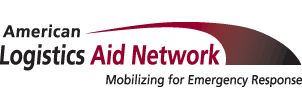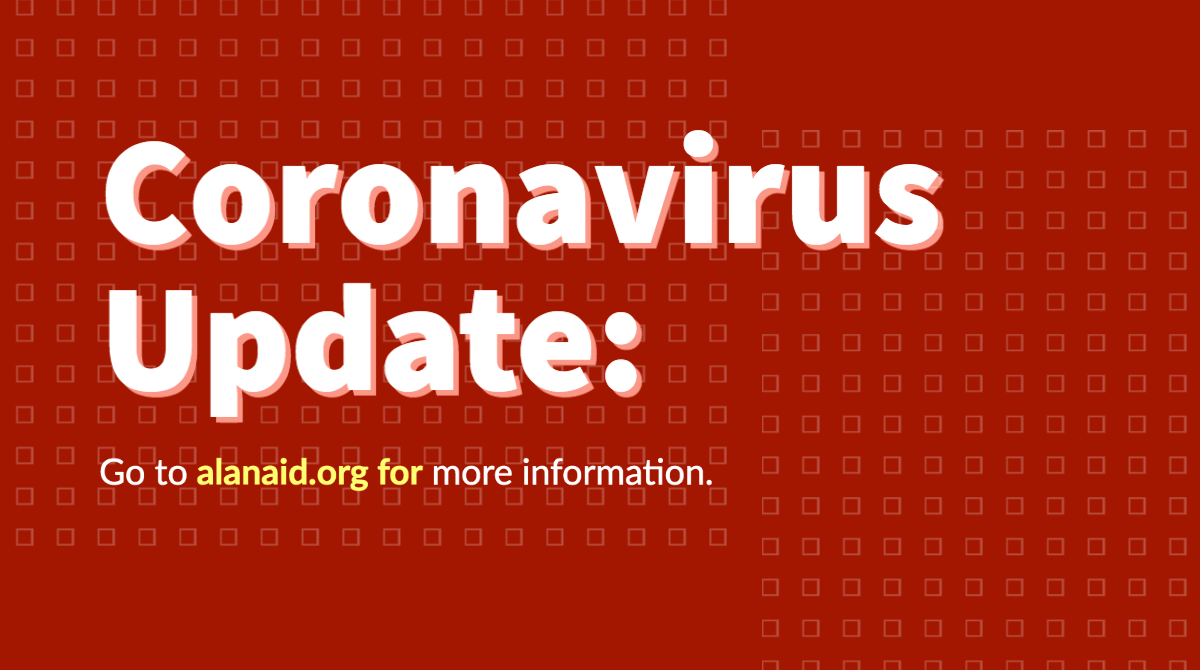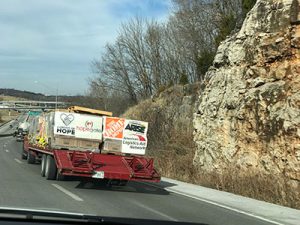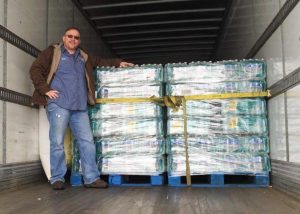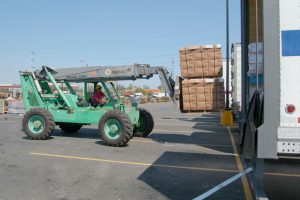[vc_row][vc_column][vc_column_text]There are some questions that celebrities get asked more often than others. (These include, “What are you wearing?” “What did you steal from the set” and, “How did it feel to perform with _?”)
Although ALAN isn’t a celebrity we can definitely relate. Because ever since early March, we’ve had one question that has popped up more than all the others combined: “What is ALAN doing to help with COVID-19?”
That’s why now seems like an ideal time to share the following COVID-19 Q&A with you.
We hope it will give you a better sense of how we roll, what kinds of solutions we’ve been working on – and how we’re always working hard to save lives through logistics.
On behalf of all of us at ALAN, thank you for supporting us and those we serve – and for doing your part to help the stem the spread of COVID-19 by engaging in safe practices like frequent hand-washing and social distancing.
Stay strong. Stay healthy. And stay in touch.
Kathy
COVID-19 has become a large global health emergency. Is ALAN helping?
Yes. ALAN has been closely monitoring and sharing information about the novel Coronavirus (COVID-2019) since January. Just as important, we’ve been keeping a careful watch on the virus’s effect on supply chains.
Every non-pharmaceutical intervention that’s being used to slow the spread of this virus – including business closures, restricted work hours, and instructions to shelter in place –has major supply chain impacts. And we’ve been working around the clock to help our government, non-profit and business partners find ways to minimize these impacts and keep goods flowing as steadily and reliably as possible, all while balancing the need to exercise caution and keep the virus at bay.
Our goal is to ensure that all heath and humanitarian organizations continue to get the supplies they need for this crisis and many others. It’s also to support the ongoing health of the U.S. supply chain so that people can continue to receive nourishment, hydration, medical supplies and other necessities.
How has ALAN been helping?
Until very recently, a lot of our efforts have been behind the scenes, which is very common for us in the days or weeks leading up to a major emergency. These efforts have included checking in with our nonprofit networks about what logistics resources they anticipate needing so that we can be ready to act, and sharing important safety and preparation messages from various health and disaster preparation sources to help keep people accurately informed. (You’ll find many of these messages or sources in the Coronavirus section of our Disaster Micro-site. )
But now, as the virus’s supply chain impacts have begun to intensify, we’ve started to take a more visible role. For example:
- Since mid-February, we have hosted or participated in numerous daily relief and coordination calls with our association and non-profit partners in order to help them navigate the challenges of each new virus mitigation measure.
- We have begun receiving and working to fulfill requests for humanitarian logistics assistance related to the spread of COVID-19.
- And we’ve been interfacing with our industry partners and various government groups to enable more public-private collaboration and problem-solving and pave the way for faster supply chain response and resilience.
We fully expect these activities to increase as this emergency continues – and to begin supporting more humanitarian efforts to move critical commodities in the near future.
Has ALAN received any requests for logistics assistance as a result of COVID-19?
Yes, many of which you’ll find posted in the Active Logistics Needs section of our Disaster Micro-site. One of our first requests was to help a southeastern state find donated warehousing space to store and stage personal protective equipment. Thanks to the generosity of our logistics community, we were able to fulfill that request in less than four hours.
Is the volume of requests that ALAN has received thus far unusual?
It’s really not usual, because most of our requests for logistics assistance usually come in long after a disaster has hit, because disaster recovery is a process, not an event. And since this is a pubic heath crisis of unprecedented proportions, many people are still just really beginning to understand what’s needed in terms of donated space, transportation, equipment, and services – and where the biggest supply chain pain points are.
And this disaster is even more challenging because many of measures that are being taken (and legitimately so) to protect people’s health are temporarily disabling some of the ways that people ordinarily procure things. For example, schools are no longer open to provide lunches or send home for hungry students. Many restaurants are closing or restricting their hours of operation. And most grocery stores have experienced huge surges in demand due to panic buying, which has led to many shortages and stockouts. So some supply chains have had to be reconfigured or accelerated almost overnight in order to accommodate these realities, and the rules and challenges keep changing.
In light of this, we hope people will bookmark ALAN’s Disaster Micro-site and visit it frequently in the weeks or months ahead. There will probably be many opportunities to help.
When most people think of ALAN, they tend to think of its help with hurricanes or storms – not pandemics. Has ALAN ever assisted with a disaster of this nature before?
This is not ALAN’s first health emergency. We stand ready to help with any kind of crisis that requires supply chain support.
Among other things, we have previously assisted with shipments for Ebola outbreaks, coordinated shipments to help prevent the spread of cholera overseas, and helped with numerous shipments to the U.S.S. Comfort.
However it’s safe to say that there hasn’t ever been an emergency of this nature during most of our lifetimes. Most disasters are typically confined to a state or region. But this one is global in scope – and we will all have to collaborate and cooperate like never before in order to get through it together.
A lot of organizations have been sending out multiple e-mails, news releases and advisories about COVID-19. But ALAN hasn’t. Why?
At times like this, it’s essential to let the experts do the talking as much as possible. And in the case of this particular disaster, the experts are the many health, safety and government officials working to protect people and prevent the virus’s rapid spread. Our goal is to support that health and messaging, not to compete with it, especially now as people are starting to get inundated with messaging. So we’ve intentionally tried to leave the lines of communication clear.
That said, some of the biggest concerns that people seem to have right now involve running out of food or other essentials. As a result, you may begin to hear from us more as we work with our partners to protect the country’s supply chain health (which is why you recently saw us advocate for truck drivers and their access to restrooms) – and help with people’s peace of mind as they begin to adapt to this time of social distancing.
Is there a way organizations can be helping now?
Absolutely. They can always make a monetary donation to help fund ALAN’s general budget and allow us to provide help where it’s needed most. They can also offer up some of their logistics space, services (trucking) or the temporary use of their equipment. We have a place on our website where they can do this, and we find these pre-offers to be hugely helpful, because it allows us to fulfill needs much more quickly.
If organizations would like to donate medical products, we’d recommend doing so via Healthcare Ready, which has just launched a matching portal program to help collect donations of personal protective equipment and other healthcare products and match the to the locations where they’re needed most. (Here’s a link to that portal so you can pass it along: https://hub.bio.org/)
It’s also important not to forget that there are other disasters happening right now, too, and the communities impacted by those disasters – like Nashville’s and Arkansas’ recent tornadoes – are also very much in need of our help.
Are there any final comments you’d like to add?
Now is a great time to remind people that ALAN is only looking for offers of donated space, transportation or equipment, not offers to purchase these things. Everything we provide to relief organizations is supplied free of charge, so assisting us is solely a humanitarian opportunity, not a business deal.
We also aren’t able to help carriers connect with FEMA for work or new business opportunities. While we at ALAN would like to be of help, we’re solely a non-profit who serves disaster response organizations, and we’re not able to assist with any other requests at this time. Our best advice is to recommend that these carriers contact FEMA directly using the links below as a starting point.
- https://www.fema.gov/industry-liaison-program (Once there, scroll down to the “How to do Business with FEMA” )
- https://www.fema.gov/transportation-programs (Once there, scroll down to the “Becoming A FEMA-Approved Transportation Provider” section.)
In addition, we’d like to remind people not to engage in panic buying or hoarding if they can help it – and to check in frequently with their neighbors and loved ones to ensure they have what they need. (For more practical suggestions, see our HELP OTHERS blog. )
Last but certainly not least, we’d like to give a shout-out to all of the unsung logistics industry heroes. From the truckers and warehouse employees who are showing up to work every day to ensure critical supplies still get shipped and delivered, to the many companies that are offering up donated space, services or material handling equipment, the people of our industry have stepped up in a very big way. While the generosity and dedication of the logistics community never surprises us at ALAN, people who work outside the industry don’t always get a chance to see it or appreciate it quite like they have in the past few weeks. Now is our industry’s time to shine – and it really has.[/vc_column_text][/vc_column][/vc_row]
